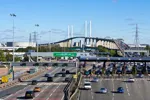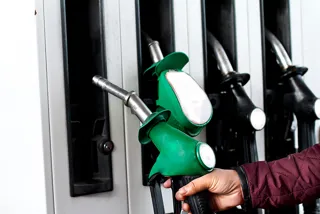Fleets are split over the merits of replacing fuel duty and road tax with a new road pricing regime, new research suggests.
Fewer than half (45%) of the respondents to a Fleet News survey said they were in favour of an alternative pay-as-you-go taxation scheme based on miles driven. However, more than a third (36%) said they were not.
A radical overhaul of road taxation is not expected to be announced by the Chancellor of the Exchequer, Rishi Sunak, in the Budget on Wednesday (March 3).
But declining revenues, from fuel duty receipts and vehicle excise duty (VED), are an inevitable consequence of drivers making the switch to electric vehicles (EVs) and the Government’s policy to ban the sale of new petrol and diesel vehicles from 2030.
New research from The AA illustrates how quickly the UK car parc make-up could shift, with the number of EVs on UK roads expected to exceed that of diesel-powered models by 2030.
If approximately 33 million cars remain on UK roads between now and 2030, it predicts alternative fuels (electric, plug-in hybrid, hybrid and hydrogen) could account for half, at 16.5 million cars.
Paul Hollick, chair of fleet and training body, Association of Fleet Professionals (AFP), says that Budget 2021 and those to come in the future, all need to be seen against the backdrop of declining revenues from internal combustion engine (ICE) vehicles as EVs become more mainstream.
“It is unavoidable that the Government needs to replace that revenue and it is right that they look to do so through taxing road travel and transport in some way,” he said. “The question is how?”
Fleet News has been calling for the Government to launch a feasibility study since its Fleet Industry Manifesto report in 2015.
MPs on the Transport Committee are attempting to get some clarity through an inquiry into zero emission vehicles and road pricing, which was launched last December.
The committee is considering the implications of accelerating the shift to zero-emission vehicles, including bus and freight vehicles, and the case for using new technology to introduce some form of road pricing.
LITTLE CONSENSUS
Hollick believes there is “little consensus” on how a new scheme would work. “The main options appear to be some form of annual road toll per user or vehicle, or toll per mile travelled,” he said.
“However, these are likely to work in conjunction with other forms of charging, such as extended ULEV (ultra-low emission vehicle) zones and even emissions-based parking levies.”
When combined with fleet-specific taxation, such as benefit-in-kind (BIK) taxation of vehicles and approved mileage allowance payments (AMAPs), Hollick told Fleet News: “It’s potentially a very complicated picture and that is before you even start to ask questions such as how mileage would be monitored and charged.”
In total, taxes on UK motoring, including VED, fuel duties and VAT, raise around £40 billion per year or 7% of total revenue to the Exchequer. Of this, BIK, covering the provision of company cars, raises close to £1.8bn.
However, a recent Government report acknowledged much of this revenue is likely to be “eroded during the transition to a net zero economy”, with the tax take “wholly or partially at risk”.
The warning, published in HM Treasury’s interim Net Zero Review, came as the National Infrastructure Strategy also emphasised the need for motoring tax revenues to ‘keep pace’ with the uptake of EVs.
Hollick said: “Everyone knows that change has to come in this area and the conversations we need to have should start sooner rather than later.”
KEEP IT SIMPLE
In its submission to the Transport Committee’s road pricing inquiry, the British Vehicle Rental and Leasing Association (BVRLA) outlined 10 guiding principles for any road pricing scheme.
They included: an early and extensive consultation; making it simple to administer; providing a clear link to transport infrastructure and decarbonisation; and ensuring it treats all road users fairly.
BVRLA head of policy and public affairs Thomas McLennan believes that if Government engages with the fleet industry, a “world-leading road pricing system optimised for the UK can be developed”.
“Fleets can work as a partner with Government, spearheading the testing, development and deployment of any road pricing scheme,” he said. “We believe the best road pricing system is simple, data-led and not overly prescriptive in its approach. It must be able to work well for all vehicle use cases.”
It is a view held by fleets, who fear an admin-heavy charging regime.
Matt Hammond, head of fleet at Altrad Services, says he is in favour of road pricing, but stressed it needed to replace current road taxes, rather than becoming an additional cost charged by multiple operators.
“We are already paying to use the M6 toll and Dartford and Humber crossings,” he said. “My hope would be that these existing independent tolls could be incorporated into a single road pricing mechanism as well, otherwise we will end up with multiple agreements for different parts of the country or, worse still, different motorways.”
The potential cost to fleets from having to deal with administering a new road pricing regime is also a key concern of Steve Winter, head of fleet at British Gas. He told Fleet News: “When you consider clean air zones, ultra-low emission zones and the administrative burden for companies to register vehicles, it’s already really challenging.”
Winter fears any new scheme could add “significant cost” to a fleet operator, particularly if they are a commercial operator, where entering towns or cities at peak times is unavoidable.
“There will be a number of fleets out there that recognise road pricing is inevitable, but they want to know how it will avoid penalising them for doing their job,” he said.
FUEL DUTY INCREASE
Fleets will have to wait to see how any future road tax changes could be framed, but Budget 2021 could leave fleets facing an increase in fuel duty as the current Chancellor considers ending the 10-year freeze, first introduced by George Osborne.
The total tax per litre of petrol and diesel, adjusted for inflation (RPI), has been falling steadily over the past two decades (see below).

Fleet decision-makers do not expect this trend to continue. Almost three-in-five (58%) respondents to the Fleet News survey expect a hike in fuel duty this year. Fewer than a quarter (24%) believe the freeze will continue for a further 12 months.
The Chancellor announced in the previous Budget that the fuel duty freeze would continue for a further year, costing the Treasury £800m in lost revenue.
In Budget 2020, the Treasury outlined expected tax receipts from fuel duty each year up to 2024/25. It suggested it would collect £27.5bn this tax year, a £200m decline on £27.7bn in 2019/20. But then it predicted an increase to £28.1bn the following year (2021/22), before reaching £30.5bn in 2022/23, £31.2bn in 2023/24 and £31.7bn in 2024/25.
Budget 2021 will give an update on these figures, with Covid-19 expected to have significantly driven down revenues for the current tax year.
Hammond told Fleet News that fleets were going through a tough time, caught between the pressure from Government and environmental bodies to embrace EVs and the “stark reality” that the industry is not “ready to change”.
“The Chancellor needs to identify this situation and ease off from further penalising drivers of internal combustion engines by reviewing the BIK rates for the cleaner, lower emissions petrol and diesel cars for at least the next fleet cycle,” he said.
“Hopefully by then the industry will have caught up and the range and selection of EVs will allow drivers to naturally migrate across.
“Any measures now to further penalise drivers of ICE vehicles, through retaining the high BIK figures or any increase in fuel duty, will only have the counterproductive effect of driving more employees down the grey fleet route, which reduces the governance and controls over vehicle selection and environmental considerations.”
Dr Steve Melia, senior lecturer in transport and planning at the University of the West of England (UWE), and author of Roads, Runways and Resistance: From the Newbury Bypass to Extinction Rebellion, which tells the inside story of the most controversial transport issues in Britain since the late 1980s, believes increasing fuel duty is a better option in the short-term. Read more here.
A version of this article was first published in the February edition of Fleet News.






















Login to comment
Comments
No comments have been made yet.